Search
Showing 10 of 1954 results for NARSC 2016 conference registration fees student pre advance late July 2016
-
Prime Minister’s Scholarship group round opening soon for applications
New Zealand organisations and institutions will soon be able to apply for this year’s group round of Prime Minister’s Scholarships for Asia and Latin America.
This award is administered by Education New Zealand Manapou ki te Ao (ENZ), enabling New Zealanders to experience international education and continue to build and maintain key trade relationships between New Zealand and key Asian and Latin American regions.
Acting Group General Manager, International Marketing, Brand & Scholarships, Sahinde Pala, said the group programme is flexible, and applicants are encouraged to think creatively about their learning programmes.
“We invite organisations and institutions to design a learning experience that can give learners the chance to follow their passion, develop connections, and make an impact in our global and local communities” she said.
Successful past applications have included semester exchanges, language immersion, indigenous-to-indigenous exchange programmes, internships, and research projects.
Applications can be made by any education provider (including universities, institutions, wānanga, iwi, hapū, whānau, institutes of technology and polytechnics, and private training establishments).
About the scholarship
All citizens or permanent residents of New Zealand over the age of 18 can apply for the scholarship. Recipients do not need to be in tertiary education, as the programme aims to make international educational opportunities accessible to all New Zealanders.
The scholarships cover tuition fees for offshore institutions, and a contribution towards internship fees, flights, living, accommodation, and visas.
Since the programme’s beginning in 2013, at least 3810 scholarships have been granted to New Zealanders.
Applications are open from 26 February to 11 April, find out more by visiting the Prime Minister’s Scholarship website.
You can also email any questions to the ENZ Scholarships team at scholarship@enz.govt.nz.
-
Visa options checker live
The options checker provides better information specific to student circumstances on the range of visas that applicants may be eligible for.
The new Visa Options Check is easy to use. Users start by choosing one of four simple options: Visit, Study, Work or Live. From there, the navigation is straightforward.The new options checker is the first, small step in the rollout of Immigration New Zealand’s new technology platform, Immigration ONLINE.
When fully implemented by the end of 2015, Immigration ONLINE will allow all visa applicants to apply online. Information entered into Visa Options Check will be used to pre-populate part of a customer’s application form. Many will be able to complete the entire process online, through to final decision and receiving their visa.
Visa applicants, or advisers acting for them, will be able to complete and upload forms, supporting documents and photos, pay fees and ask questions online.
Online visa applications will start later this year with students and some temporary workers. By mid-2014, full online student visa processing will be possible through to final decision, and advisers will be able to view appropriate details of their clients’ applications online. -
Catching up with the Canadians – news for the school sector
“Everyone knows that Canada is a key competitor for NZ’s school sector,” Mary says. “I wanted to find out more about their success and learn about the challenges they face”.
“Many of the people I met were surprised to learn that NZ hosts about 16,000 international school students – punching above our weight internationally when compared with Australia’s 18,000 – but still a long way from Canada’s 46,000 enrolments! Nevertheless Canada does see Australia and NZ as its main competitors offshore.”
The theme of the Conference was Collaborating to Educate Tomorrow’s Global Citizens. It was attended by 250 delegates from across Canada. Delegates represent school districts or boards, so each delegate could be working with 10 or 50 schools.
International speakers at the conference noted New Zealand’s recent increased profile and activity level in the school sector, citing government support and the establishment of SIEBA as positive developments.
“We are developing a relationship with CAPS-I, with both sides keen to explore potential collaboration” says Mary.
“During my visit I learnt a lot about Canada’s school international education industry. They draw from many of the same markets we do, but as you might expect NZ is stronger (relatively speaking) in South East Asia while Canada is stronger in Latin America.
“There is very little federal government support for Canadian schools’ international business, because education is a provincial responsibility. Canadian schools are committed to delivering high quality student experiences, but they don’t have a Code of Practice equivalent to regulate high professional standards.”
Mary will be sharing more about her learnings on Canada at a pre-conference workshop at NZIEC 2015.
-
From the CE: New Zealand higher education in the spotlight
Kia ora koutou,
Over the past few weeks, I have been abroad in both China and the United States promoting New Zealand education.
In late May I was delighted to attend my first NAFSA conference in San Diego, California. NAFSA is the world’s largest international education conference and this year it attracted over 8,000 attendees. ENZ supported the University of Auckland, Auckland University of Technology, University of Waikato, Massey University, Victoria University of Wellington, University of Canterbury, University of Otago and Whitecliffe College at the New Zealand Pavilion. Our collective involvement with such a significant event provided us with a strong platform to showcase New Zealand’s unique education offering to a global audience.
Following NAFSA, I travelled to Connecticut to meet representatives of the Mashantucket Pequot nation, during which I had a useful exchange on indigenous-to-indigenous education and engagement. It was a genuine privilege to be hosted by this small, resilient tribe, into which my whānau has whakapapa links.
Last week, I joined the Prime Minister’s Trade Mission to China alongside education delegates from UP Education, Te Pūkenga – New Zealand Institute of Skills and Technology, and Victoria University of Wellington.
The Trade Mission was an opportunity to support the tertiary education sector’s engagement with China which is our largest source market of international students. The visit also reinforced at the Government and sector level our strong bilateral education relationship.
One of our key deliverables was an education event to promote New Zealand’s reputation for world-leading research and high-quality education at Fudan University in Shanghai. Fudan is one of China’s most prestigious universities and while there we took the opportunity to celebrate 20 years of the New Zealand-China Tripartite Partnership Programme. A wonderful outcome from the event was the signing of an MoU between Victoria University of Wellington and Fudan University that will see the universities resume student exchanges and pursue research cooperation in public health, biotechnology and climate science.
In Beijing, we hosted New Zealand Education Connect and showcased New Zealand as a study destination to our key partners, and alongside Prime Minister Rt Hon Christopher Luxon, we officially launched New Zealand’s Country of Honour campaign for the China Annual Conference and Expo for International Education (CACIE) which will be taking place later this year.
Finally, this month the results of the latest QS World University Rankings 2026 were published. New Zealand ranked first in the English-speaking world and fifth globally for the overall quality of its higher education.
The 2026 results see New Zealand universities improve across academic reputation, citation per faculty, and international student indicators. New Zealand also ranks the highest globally in terms of employment outcomes among key English-speaking study destinations.
This is a fantastic result for our universities and reinforces New Zealand’s position as a high-quality and welcoming international education destination.
Whāia te mātauranga hei oranga mō koutou
Seek after learning for the sake of your wellbeing
Ngā mihi nui,
Amanda Malu
Chief Executive -
Minister sings praises of a NZ education in Japan and Korea
In late August, Minister Steven Joyce visited Japan and Korea to advance New Zealand’s business, innovation and education interests. Most of all, it was a great occasion to celebrate the friendship between our countries.
The visit kicked-off in Tokyo, where ENZ joined the Minister to meet with Toshiei Mizuochi, Japan’s new State Minister for Education, Culture, Sports, Science and Technology, to discuss opportunities in science and innovation. Minister Joyce highlighted New Zealand’s flexible qualification framework and expertise in vocational education, which Minister Mizuochi welcomed.
Following this, Minister Joyce went to Busan and Seoul, Korea, where he visited the Centre for Creative Economy and Innovation (CCEI) and talked about opportunities for working on film projects with Auckland. This includes a September workshop organised by Screen Auckland and AUT to teach staff and students from Busan-based Dongseo University more about film.
Minister Joyce also met with Lee Joon-shik, Korea’s Deputy Prime Minister and Minister of Education, to explore ways to grow the education relationship between Korea and New Zealand. This included the possibility of more Korean-language teaching and learning in New Zealand schools.

CCEI, from left to right: Cecily Lin, Acting Regional Lead, ENZ; CCEI staff; John Riley, Deputy Head of Mission; Clare Fearnley, NZ Ambassador; Minister Joyce; Cho Hong-geun, Head of CCEI; Ryan Freer, New Zealand Trade Commissioner
In each country, Minister Joyce hosted a reception for local guests including school teachers, agents and representatives from tertiary institutions. At the Tokyo reception, 13 high school students from Ikubunkan Institute of Education performed a haka and waiata for the Minister they had learned while studying in New Zealand. At the Seoul reception, guests were joined by Korean rappers Microdot and Sanchez who spoke with affection of their time studying in Auckland. Both evenings provided a wonderful opportunity for Minister Joyce to promote New Zealand’s education and lifestyle, the importance of an education relationship between our countries and to introduce the Prime Minister’s Scholarship for Asia.
“Education cooperation is an important way of developing a closer relationship between our countries, and encourages us to discuss and cooperate on issues of mutual interest and benefit,” said Minister Joyce.
The ENZ student fair will be held in Japan on 8 October in Fukuoka, and Tokyo on 9 October.
-
Reminder of new data collection requirements
Private Training Establishments who do not receive SAC and/or Youth Guarantee funding from the Tertiary Education Commission, and are also signatories to the Code of Practice for the Pastoral Care of International Students are reminded that they are required to submit new data on their international students from 31 March 2016.
The August 2015 change to the Private Training Establishment (PTE) Registration Rules made it a condition of PTE registration to submit specific data to the Ministry of Education.
Consultation with exempted PTEs
A temporary exemption was granted to PTEs that provide English Language training only. For further information on the exemption please refer to the NZQA website.
An independent facilitator, Pania Gray of Kororā Consulting, is consulting with exempted PTEs on their approach to the new data collection requirements. Pania is consulting with exempted PTEs who are members of English New Zealand, via this representative body. Exempted PTEs who are not members of English New Zealand, and who would like to discuss the issues with Pania, are invited to contact her at: pania@kororaconsulting.co.nz.
Background about the data collection project
The Ministry of Education, Education New Zealand and the New Zealand Qualifications Authority (NZQA) have been working on a project which will gather better information from Unfunded International Education Providers (UIPs) using an automated data collection system.
The aim of the data collection project is to provide better market insights and analysis, and more targeted risk assessments, that will to help inform plans and activities relating to international education.
Good data and in-market intelligence can influence government strategy and policy, and enable informed data-driven decisions to be made. These decisions can work to the benefit of international education providers, international students and the wider international education industry.
More about the data and how to submit it
The UIP Data Collection – SMS Specification document explains which providers are required to submit data and how the data must be submitted.
Further information is available on the Services for Tertiary Organisations (STEO) website.
If you have any questions, or need clarification on who the exemption applies to, please email UIP.Datacollection@education.govt.nz.
The rule change took effect on 1 March 2016 and the new data must be submitted from 31 March 2016. If you require assistance with setting up the data return, please email UIP.Datacollection@education.govt.nz.
-
A million-plus in a month
As part of our support for the Christchurch Rebuild Programme, ENZ partnered a delegation of six institutions led by Canterbury Development Corporation (CDC) to promote the region across six Indian cities.
Agent training sessions in each city reinforced the range of opportunities offered by the Canterbury region. ‘Showcase Christchurch’ events in New Delhi and Mumbai, included visits to prominent Indian institutions, a business development round table and networking session. A highlight was announcing the second annual ‘Christchurch Educated Skills Scholarships’ worth more than NZ$100,000 which received an excellent reception from students, agents and Indian media.
Also this month, through partner ENZ Recognised Agents (ENZRA), Think New branded fairs were held in Pune, Kolkata, Ahmedabad and Kochi. More than 20 New Zealand institutions participated in the fairs which collectively attracted some 1000 pre-screened potential students for New Zealand.
“Working with recognised agents on these fairs enables us to have a wider geographical reach and retain two rounds of New Zealand education fairs in India (in April and August). The fairs all comply with ENZ brand guidelines ensuring consistency in messaging and agents also pre-screen students so a quality turnout is assured,” says Ziena Jalil, ENZ Regional Director – South and South East Asia.

Above: The ENZRA fair in Kochi saw a good turnout of quality students
Amidst the fairs and Christchurch Educated events, Stephen Fleming continued to bat for New Zealand education, connecting with more than 2,200 enthusiastic students through high profile institutional visits in Chennai, Mumbai and Bangalore. In addition to raising awareness for New Zealand education the visits opened up a range of engagement opportunities for New Zealand institutions such as student and faculty exchanges and twinning programmes.

Through a variety of media initiatives, Stephen reached 1,702,218 active readers and listeners across India to convey New Zealand education messages.
Building on this momentum, ENZ has launched two student competitions in India, again aimed at targeting high quality students and raising interest and preference for New Zealand as a study destination.
For more information please email: india@enz.govt.nz
-
Highlights from Education Fairs and events in Japan and Viet Nam
Japan
In early October, ENZ welcomed 844 visitors to engage with 40 New Zealand education providers representing the school, vocational, English language and university sectors at the first New Zealand student fair in Japan since 2019.
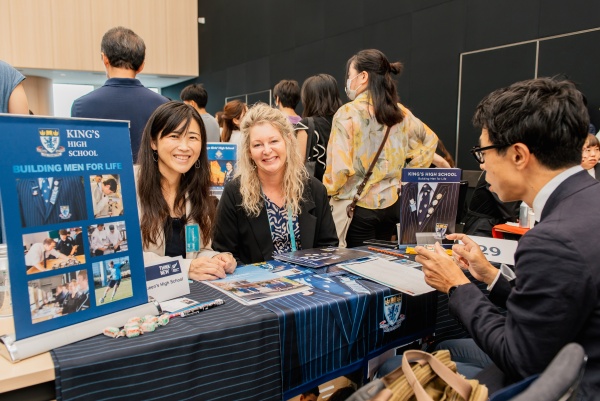
Teresa Robertson, International Director from King’s High School with Eriko Ishiguro, an interpreter.
The fair at Roppongi Academy Hills in Tokyo on 1 October had a programme of events that highlighted the strong connections between our two countries. Over the following two days, 49 and 45 of the visiting New Zealand education providers attended the ENZ Agent Seminars in Tokyo and Osaka respectively. Both seminars saw a record number of local agents and education providers, with 181 present in Tokyo and 77 in Osaka.
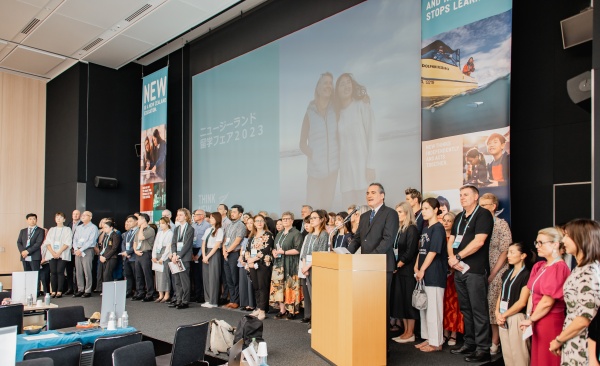
His Excellency Hamish Cooper, New Zealand Ambassador to Japan with the New Zealand contingent. The New Zealand education providers sang two waiata to support the Ambassador’s speech. A recording of ENZ’s waiata ‘Manapou ki te Ao’ was played and explained in Japanese to convey the waiatas’ meaning and lyrics.
Misa Kitaoka, ENZ’s Director of Education - Japan said that these events proved a great opportunity for the institutions to network with local school representatives, education and travel experts and gain valuable insights into the Japanese market. She also said that there was an evident increase in interest in long-term study in New Zealand both at the school and tertiary levels, compared with pre-Covid.
"This new trend is testament to the well-established presence New Zealand now has as a study destination in Japan. It can also be attributed to the effects of the Japanese government’s internationalisation policy in the education sector. With over 200 International Baccalaureate schools in Japan, more students are bilingual and eligible for direct entry to New Zealand universities.
There are also over 500 Japanese universities now adopting ‘sogo gata senbatsu’ (comprehensive admissions) that provide a holistic assessment of the applicants including their English language skills and overseas experience. This means that more students are choosing to complete secondary school education in New Zealand to apply to Japanese universities,” said Misa.
The education events along with pre-departure briefings where Japanese market insights were shared and the welcome reception upon arrival with key Japanese education stakeholders and partners were all well-received by the education providers in attendance.
Kerrie Hodgson, Internationalisation Business Partner, Te Pūkenga New Zealand Institute of Skills and Technology said it was clear that great effort was put into promoting the events and New Zealand education. “The numbers were high, and I felt that enquiries were more in depth than previous years, and beyond English Language study,” said Kerrie.
Renee Millner, International Director for Western Heights School in Rotorua added that the market insights provided ahead of their arrival were a great introduction to significant changes within the Japanese market.
Viet Nam
Following the action-packed week in Japan, the focus shifted to Viet Nam where the ENZ teams held several New Zealand education events in Ho Chi Minh City and Ha Noi.
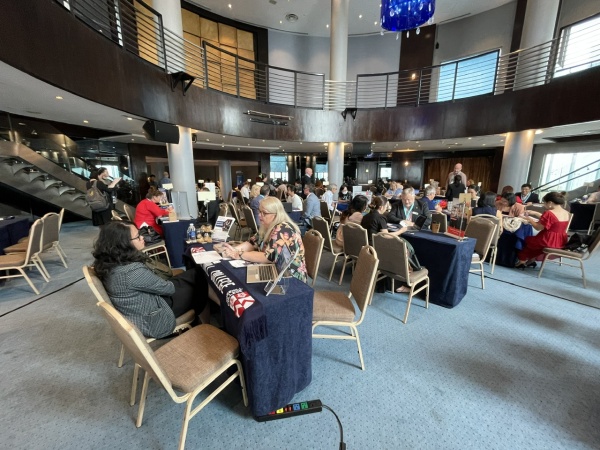
NZ institutions had one-to-one meetings with Vietnamese agents at two ENZ Agent Seminars in Viet Nam.
The series of events began with 19 NZ Masterclasses delivered over two weekends. Over 800 students registered for these online classes, in which New Zealand academics delivered a 40-minute lesson. This was followed by recruitment representatives introducing the entry requirements, scholarship opportunities and benefits of studying in New Zealand. Following the masterclasses, representatives of all eight New Zealand universities visited several schools in Ho Chi Minh City and Ha Noi, presenting to students and their families at information sessions and in some cases, taking part in mini-fairs.
Ho Chi Minh City was then host to two flagship ENZ events; the Agent Seminar and Counsellors Meet-up and following this, the NZ Education Day Fair. There was significant interest in both events with 50 Vietnamese agents meeting with 29 New Zealand institutions while 25 Viet Nam schools’ counsellors met with all New Zealand universities and Te Pūkenga. The New Zealand Education Fair saw over 500 visitors through the event with 385 leads generated.
Ha Noi followed suit with the Agent Seminar and Counsellors Meet-up attracting 40 Vietnamese agents meeting with 27 New Zealand institutions while eight Viet Nam school counsellors met with all New Zealand universities and Te Pūkenga. The events finished with a second popular Education Fair with visitors estimated at about 400 people resulting in 258 student leads.
Van Banh, ENZ's Market Manager for Viet Nam said that this year's education events had a mix of the traditional with a more interactive, modern, and sustainable approach which resonated well with attendees.
"Our team wanted to make these events as fun and interactive as possible to show what a New Zealand education is all about. In addition to the one-to-one opportunities for students and parents to talk to the New Zealand institutions, there were workshops with the participation of key opinion leaders, and well-known English IELTS trainers. There were also activities run by our partners such as English skills testing and minigames about New Zealand.
“We also took a more sustainable and innovative approach to our events to support the messaging that we communicate to students about New Zealand being a country that cares about sustainability and the environment, with an eye to the future through innovation. We replaced traditional printed backdrops with digital ones shown on TV screens for each booth, significantly reducing our waste and energy usage in manufacturing production. Our main stage also had a set of three interactive and eye-catching LED screens.
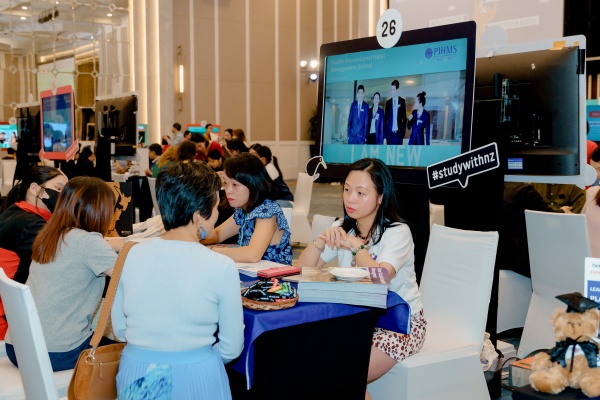
ENZ’s Regional Director for Asia, Ben Burrowes, attended both events and said, “on behalf of the ENZ teams in Viet Nam and Japan, I would like to extend a huge thank you to the New Zealand education providers who attended our events this year.
“As we all know, these face-to-face connections are extremely valuable as we continue to rebuild New Zealand’s education brand in such an important region for our sector. We look forward to hosting you again soon."
-
From the CE: Going for growth
Kia ora koutou,
The month of February has seen several important announcements.
Firstly, we received confirmation that the Minister of Education, Hon Erica Stanford, now has responsibility for international education and Education New Zealand.
Minister Stanford is also Minister of Immigration and the Lead Coordination Minister for the Government’s Response to the Royal Commission’s Report into Historical Abuse in State Care and in the Care of Faith-based Institutions. We are looking forward to working closely with our new Minister to advance her priorities for ENZ and international education.
The Government also announced its economic growth plan, Going for Growth: Unlocking New Zealand’s potential. International education is a key plank in the Government’s economic growth agenda and it is one of New Zealand’s major export revenue generating sectors – one that generates jobs, supports the labour market, attracts and retains global talent, and enhances New Zealand’s international relationships. As a sector, international education contributed $3.34 billion in value to the New Zealand economy to the year ending June 2024.
Continuing that theme, economic growth is the focus of the Prime Minister’s visit to Viet Nam this week. Our brand health research has identified Viet Nam as the fastest growing market for awareness of New Zealand as an education destination. International education is a central feature of the mission, which has strong provider representation. I’m looking forward to participating and will be sharing some insights in my next column.
This month we were delighted to welcome Dr Ron Xavier as ENZ’s new Regional Director Greater China and Counsellor Education. Ron joins us from the Ministry of Business, Innovation and Employment where he was the Science and Innovation Counsellor. Ron has worked in China for over six years and has previously been involved in prime ministerial visits and Chinese ministerial visits to New Zealand. I had the pleasure of meeting Ron when I was in China late last year and know he will be a great addition to our team in Beijing.
Whakapau kaha ki te whai i te ao hurihuri
Be strong in pursuing the ever-changing world.
Ngā mihi nui,
Amanda Malu
Chief Executive
Education New Zealand Manapou ki te Ao -
Huge education potential with Viet Nam
“It was a great privilege to be part of this visit. We were warmly welcomed everywhere, and there was a lot of interest in New Zealand education,” says Grant McPherson, Chief Executive at Education New Zealand Manapou ki te Ao (ENZ).
“An education forum in Ha Noi was a late addition to the programme, in response to a request from Viet Nam’s Ministry of Education and Training - this shows the high level of enthusiasm and energy for this relationship.”
Eleven representatives formed the New Zealand delegation for the education forum. Key officials and education sector representatives from Viet Nam joined the event, which was hosted by Vice Minister Nguyen Van Phuc. Institutional autonomy, scholarships, and foreign investment in education were the three main topics on the agenda, generating animated questions and discussion.
Three education arrangements were signed during the Prime Minister’s visit. The Education Cooperation Arrangement between the Ministries of Education in both countries was renewed, with the signing witnessed by the two Prime Ministers.
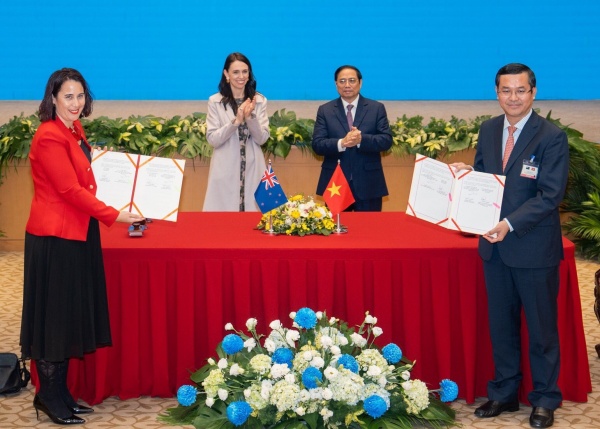
University of Auckland Vice Chancellor Dawn Freshwater also signed two arrangements with Ho Chi Minh City University of Technology (HCM-UT), relating to qualifications in computer and data science.
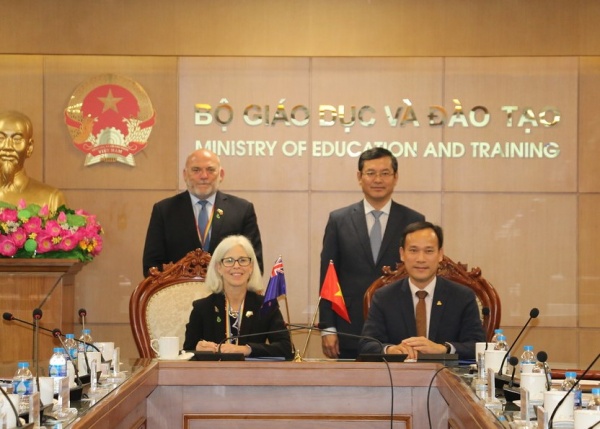
The visit also included an opportunity for the Prime Minister and the delegation to meet with around 70 Vietnamese alumni.
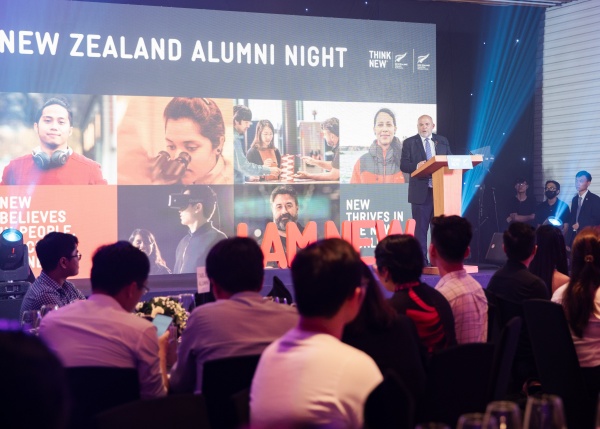
“Over the years, many Vietnamese students have studied in New Zealand, and they have become part of a network of influential alumni. These relationships span every sector of Viet Nam business and government,” Mr McPherson said.
“Five alumni showcased their businesses and social projects at the event and had the opportunity to discuss their work with Prime Minister Ardern Dave Quach, Hoa Pham, Nhien Le, Van Nguyen, and Ngan Le. Their work spanned sustainable textile manufacturing; a kindergarten that applies values of New Zealand’s early childhood education curriculum, Te Whāriki; mindfulness photography for social development; a tech-enabled platform that supports young people to pursue their study abroad dream; and an innovative agribusiness model for women of ethnic minorities in northern Vietnam.”
In recognition of the achievements of alumni and to support them as a community, Prime Minister Ardern launched a digital badge for Vietnamese alumni, I AM NEW, at the event.
Education was on the agenda at a business dialogue on 15 November and a business breakfast on 17 November provided a valuable opportunity to catch up with local institutional partners and agents.
The Prime Minister’s visit generated significant media and social media coverage in Viet Nam, and built on an earlier series of targeted events to promote New Zealand education in Viet Nam:
- Viet Nam Agent Seminars that enabled numerous New Zealand institutions to connect with education agents in Ha Noi and Ho Chi Minh City on 28 and 31 October, and where agents heard directly from Immigration New Zealand about student visa requirements
- ENZ’s Viet Nam Education Fairs on 29 and 30 October in Ha Noi and Ho Chi Minh City, enabling New Zealand providers to connect directly with prospective students and their families. These fairs generated similar levels of interest to events pre-Covid, and again included an opportunity for students to hear directly from Immigration New Zealand about student visa requirements
- Viet Nam School Leaders and Counsellors Meet-ups on 28 and 31 October in Ha Noi and Ho Chi Minh City, which enabled New Zealand tertiary providers to connect with representatives from international and private schools
- Launch of Te Pūkenga at an event that was well attended by education agents in Ho Chi Minh City on 31 October
- Education Workshop on Micro-Credentials in Future-focused Education on 1 November, in association with The MindLab and NZQA.
The sector has recognised the opportunities in education with Vietnam. Sector and government agencies’ work so far is helping to raise the profile of New Zealand and the quality of an education delivered by New Zealand.
- Viet Nam Agent Seminars that enabled numerous New Zealand institutions to connect with education agents in Ha Noi and Ho Chi Minh City on 28 and 31 October, and where agents heard directly from Immigration New Zealand about student visa requirements

